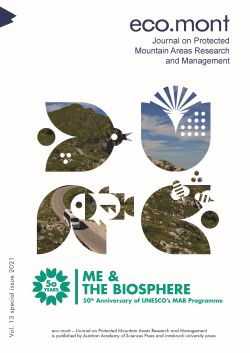Valerie Braun – Martin Coy – Günter Köck (Eds.) - Arne Arnberger (Co-Editor)
eco.mont vol.13 - special issue 2021
ME AND THE BIOSPHERE
50th Anniversary of UNESCO’s MAB Programme
Journal on Protected Mountain Areas Research and Management
Marcelo Leguia-Cruz,
Colectiva Tejer-Nos,
Natalia Ortiz Cubillos,
Pablo Mansilla-Quiñones,
Andrés Moreira-Muñoz
S. 102 - 107
doi:
10.1553/eco.mont-13-sis102
Verlag der Österreichischen Akademie der Wissenschaften
doi:
10.1553/eco.mont-13-sis102
Abstract:
Biosphere Reserves face huge challenges worldwide, especially those located in metropolitan areas such as La Campana-Peñuelas Biosphere Reserve in central Chile. As well as direct threats, such as urban sprawl and wildfires, such reserves face a less evident threat in the form of weak community engagement and awareness of the value, opportunities and challenges that the name biosphere reserve offers. Since 2015, environmental conflicts have intensified in this area of Chile, and counter-movements towards re-territorialization have arisen under the slogan “We are biosphere reserve”. This implies a deep understanding of the imbrications of the lives of humans and more-than-humans in a common territory which face common challenges with regard to the preservation of life and regenerative actions and pathways. In Chile, this local social / political / spiritual movement now converges with a national movement towards recovering sovereignty over common goods through a new Constitution. In this article, we describe a fruitful academia-community dialogue of knowledges created through a series of open-access courses, collaborative mapping, and artistic initiatives developed by citizens, such as textile-making and handcrafts using natural pigments. All of these initiatives come together within the framework of very local geopolitical actions for the preservation of the biocultural landscapes found within the biosphere reserve. We discuss these initiatives as forms of biocultural resistance and re-existence.
dialogue of knowledges, creative geographies, GeoHumanities, biocultural landscapes
Published Online:
2021/11/23 12:40:41
Object Identifier:
0xc1aa5576 0x003d0417
Rights:https://creativecommons.org/licenses/by-nc-nd/4.0/
The journal "eco.mont"; – Journal of protected mountain areas research and management – was published for the first time in June 2009.
The journal was founded as a joint initiative of the Alpine Network of Protected Areas (ALPARC), the International Scientific Committee on Research in the Alps (ISCAR), the Austrian Academy of Sciences (ÖAW) and the University of Innsbruck.
The journal aims to highlight research on and management issues in protected areas in the Alps without excluding other protected mountain areas in Europe or overseas. Its target audiences are scientists from all related disciplines, managers of protected areas and interested individuals including practitioners, visitors, teachers, etc.
The journal presents peer-reviewed articles in English by authors who research protected mountain areas and management issues within these areas. It's published twice a year as a collaboration of the Austrian Academy of Sciences Press – responsible for the e-version – and Innsbruck University Press – responsible for the print version.
Die Zeitschrift „eco.mont“ – Zeitschrift zur Forschung in Gebirgsschutzgebieten – erschien im Juni 2009 zum ersten Mal. Die Zeitschrift wurde auf Initiative des Netzwerks Alpiner Schutzgebiete (ALPARC), der Schweizer Akademie der Naturwissenschaften (ISCAR), der Österreichischen Akademie der Wissenschaften (ÖAW) und der Universität Innsbruck gegründet. Sie hat das Ziel, Themen zu behandeln, die gleichzeitig Forschung und Verwaltung in und über die Schutzgebiete der Alpen betreffen, ohne dabei andere Gebirgsschutzgebiete Europas oder anderswo auszuschließen. Diese neue Zeitschrift richtet sich an ein Publikum von Wissenschaftlern der verschiedensten Fachbereiche, an die Verwalter von Schutzgebieten und an alle sonstigen Interessierten, Praktiker, Besucher, Lehrpersonal etc. einbegriffen. Die Zeitschrift veröffentlicht begutachtete Beiträge auf Englisch von Autoren, die Fragen der Gebirgsschutzgebiete und deren Verwaltung betreffen. Sie erscheint zweimal pro Jahr, auf der Basis der gemeinsamen Anstrengungen des Verlags der Österreichischen Akademie der Wissenschaften, der für die digitale Fassung verantwortlich ist, und der Presse der Universität Innsbruck, verantwortlich für die gedruckte Fassung.



 Home
Home Print
Print
 References
References
 Share
Share

